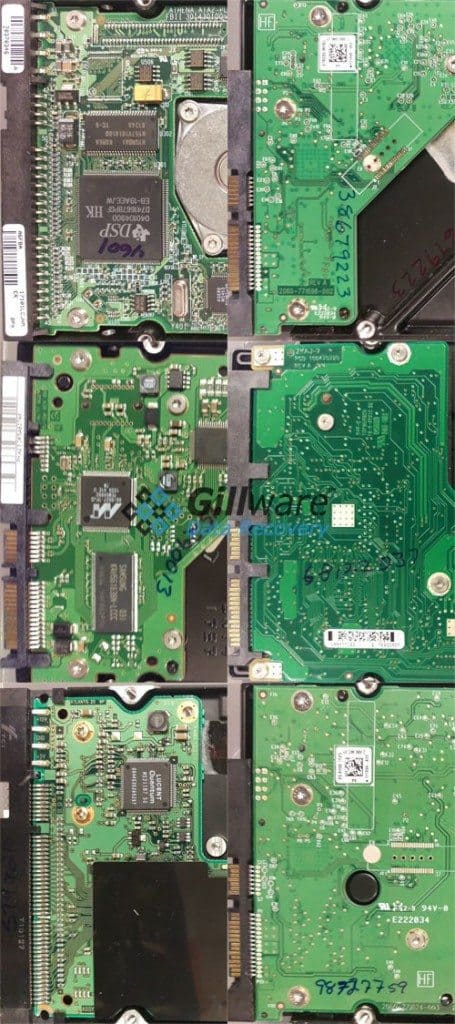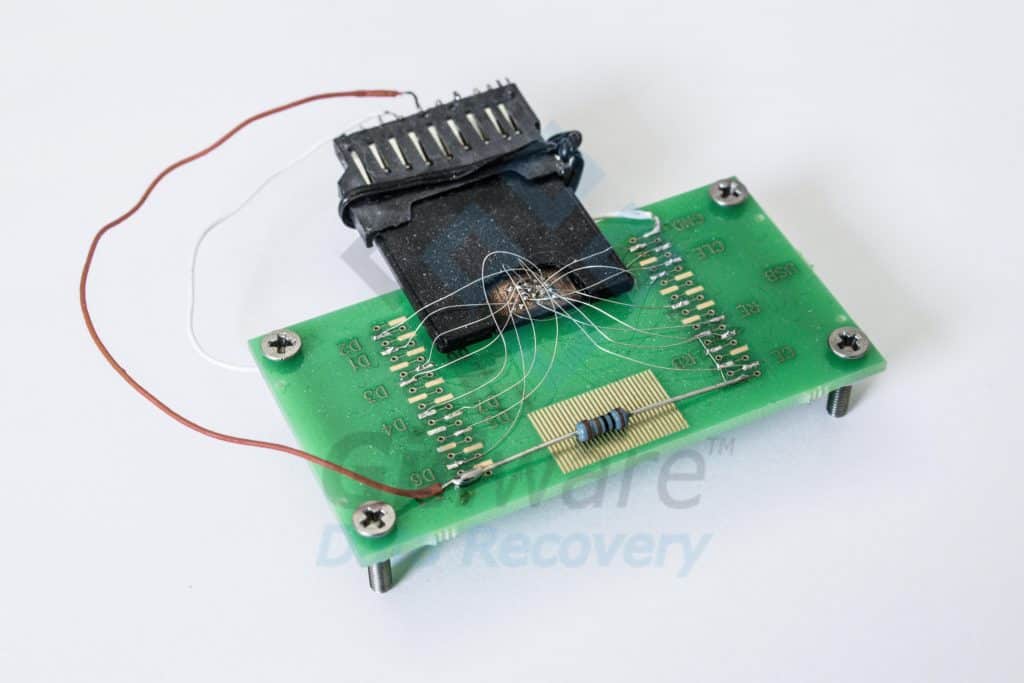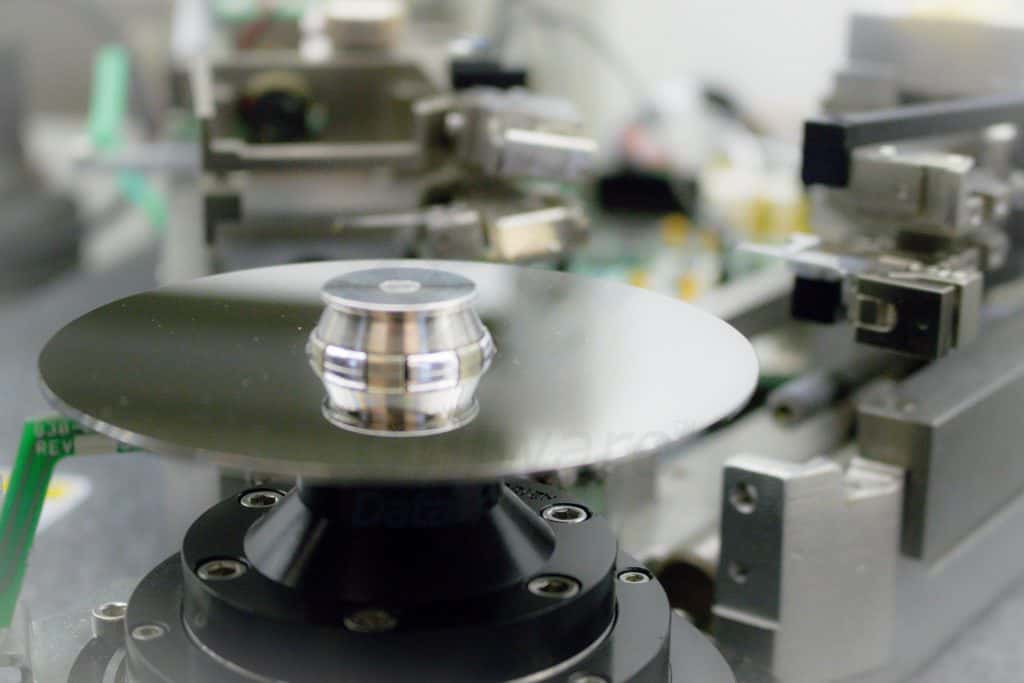Hard Drive Not Working After Power Outage: Power Outage Data Recovery
When your power goes out due to an outage or power surge, you hope that all of your devices will work when the lights come back on. Usually, they do. But failure from a power outage is a definite possibility, and one that Gillware is here to help with.
Has a power outage caused your hard drive to fail?
Whether you’ve lost important documents or irreplaceable family photos, Gillware is here to make recovery easy and painless.
If, after a power outage, your drive is not detected, or you can’t retrieve any files from your PC after a power surge, it’s easy to panic. As far as you know, everything you had on your computer is gone now! But our expert computer scientists and engineers, who’ve more or less written the book on data recovery (or at least contributed to quite a few chapters), can help you get that data back.
A summer thunderstorm that leaves you in the dark for even just a few minutes can damage your computer or external hard drive. Faulty hardware can also cause power surges that can short out a data storage device. There are many ways a data storage device can fail as a result of a blackout or power surge. A sudden loss or spike of power can short out your hard drive’s control board. It could cause your hard drive’s read/write heads to crash, its motor to seize, or its platters to become damaged. If this happens to you, you’ll need power loss and electrical surge data recovery.
What Causes Hard Drive Failure After a Power Outage?
If your external hard drive stops working after a power surge or power outage, or if your computer stops booting because of a hard disk 3F0 error, ePSA error code 0142, or other DST error or hard drive boot error after a thunderstorm, it’s because the hard drive has been, for lack of a better word, fried.
(We do have better words to describe what happened to your hard drive, though, and you can read them on the rest of this page.)
If you have any files on your computer or external drive that haven’t been backed up, you’ll need help from a data recovery lab to retrieve those files.
Can a power outage damage a PC?
Usually, a power outage won’t negatively affect your PC, outside of erasing your unsaved work. However, a sudden loss of power might cause corrupted data to be written to your hard drive’s boot sector or critical operating system files. This can cause your PC to have trouble booting up. It’s also rare, but possible for a sudden loss of power to cause your PC’s hard drive to break down. Read on to find out how.
How can i protect my computer from a power surge?
The best way to protect your computer, external hard drive, and other electronics from a power surge is to invest in a surge protector. This can be as simple as just plugging your devices into power strips, which often have surge protectors built in, instead of directly into your wall outlets. Surge protectors do wear out over time, but should protect you for many years.
Can a power outage damage a hard drive?
“Destroy” might be a strong word to use, but a power surge can certainly cause your hard drive to stop working. Every data storage device has a control board. The control board acts as an intermediary between the data on your device and your computer. Power and interface commands go into the device. Data comes out. When the PCB fails, this exchange stops.

In a traditional spinning-platter hard drive, the PCB allows electricity to power the spindle motor that sets the drive’s platters and heads in motion. In USB flash drives, SD cards, and solid-state drives, the PCB pulls data from the NAND flash memory chips.
These two components are usually kept discrete. However, in some microSD cards and flash drives, the control board and chip have been integrated into what appears to be a single package.
For hard drives, the PCB contains drive-unique calibrations. For solid-state devices, the PCB contains a controller that takes the raw data from the NAND chip and parses it into something recognizable by your computer.
PCBs are especially vulnerable to power surges. A power surge of even just 3 nanoseconds is enough to short a control board. When this happens, a flash memory device will be completely unresponsive.
A traditional hard drive can exhibit a variety of symptoms. Often, the hard drive won’t spin up. Or the hard drive spins up, clicks, and spins down.
In some rare cases, a severely shorted PCB can cause other devices hooked up to the drive to short out as well, such as your PC’s power supply unit or motherboard.
Power Outage/Surge Data Recovery for HDDs and SSDs
When you plug an external hard drive, solid state drive, or USB flash drive into your PC, they all look the same to you. But the underlying technological differences between hard disk drives and flash memory devices are huge. Electrical surge data recovery methods depend heavily on the nature of the device.
Traditional Spinning-Platter Hard Drive
Replacing a failed control board is not the simple affair it once was. On a spinning-platter hard drive, the PCB contains unique hard drive calibrations. A long time ago, hard drives didn’t need all these calibrations, and any two PCBs from the same model of hard drive were identical.
But hard drives have become much more sophisticated since then. Nowadays, while two PCBs may look identical, they are quite different. Each hard drive has its own unique calibration parameters stored on its ROM chip.
Replacing a hard drive’s shorted control board involves removing the ROM chip from one board and soldering it onto a compatible board. This is a delicate electrical procedure. Gillware Data Recovery staffs skilled electrical engineers to handle these electrical surge data recovery situations.
Solid State Devices
Solid state drives, USB thumb drives and SD cards have the control board and NAND flash memory chips divided into discrete components. Thumb drives typically have one NAND chip to store data. Solid state drives will often have several NAND chips.
The data within these chips looks nothing like the data stored on a hard drive’s platters. Data pulled from the chips is assembled into something recognizable by the control chip on the PCB.

If the PCB fails, this control chip fails with it. Electrical surge data recovery for flash memory devices involves carefully removing the NAND chips and extracting their contents. The raw data from a NAND chip can be read with any device programmer.
But these contents are absolutely useless to anyone at this point. Our data recovery computer scientists must use custom-designed software to emulate the controller chip and piece the data together correctly.
There is another kind of flash memory device, known as a monolithic USB thumb drive. Many flash drives today bundle their internal components into what looks like a single inscrutable item. It bears some resemblance to the monolith from Kubrick’s 2001: A Space Odyssey.
Data recovery from monoliths generally follows the same procedure. However, accessing the NAND chip inside is much trickier. Tiny wires need to be carefully soldered to specific contact points on the device to access the chip. This is referred to as “spiderwebbing”. It is an extremely delicate procedure for our electrical engineers.
The Power Outage/Surge Data Recovery Process
At Gillware Data Recovery, our cleanroom is staffed with highly skilled engineers. The majority of our engineers have been with us for years and have salvaged data from thousands of failed storage devices.
In power surge or outage data recovery situations, we always begin with a free evaluation. We even offer to cover the cost of inbound shipping. Prepaid UPS shipping labels are available for all our clients in the continental US.
Once we’ve assessed your storage device’s point of failure, we can determine the cost and likelihood of a successful recovery. This is when you get your exact price quote from us. We don’t do any additional work unless you approve the price quote, and we only send you a bill once we’ve successfully recovered your critical data. Once our successful efforts have been paid for, we send your data back to you on a healthy external drive. If we do not manage to recover your important data at a price that is sensible to you, you owe us nothing for our attempts.

Power Outage Data Recovery – Failed Hard Drive
A sudden loss of power can cause many different kinds of failure in a hard disk drive. Hard drives have several moving parts. All of these moving parts are potential points of failure. When you power down your computer, it sends signals to your hard drive. These signals tell the hard drive to prepare itself for shutdown. The read/write heads unpark from their position over the platters and the platters slowly spin down.
When your computer or external device abruptly loses power, the hard drive doesn’t receive these signals. The flow of power through the PCB to the hard drive spindle motor stops without warning. The heads might not have time to unpark before the cushion of air keeping them afloat above the platters dissipates.
If the hard drive is in the middle of a write operation, data can become corrupted. If a firmware sector becomes corrupted, the hard drive can be prevented from booting. The read/write can also make physical contact with the platters, damaging both.
If the heads make contact with the platters, they can stop them from spinning. This harms not only the heads and platters, but the motor as well. The hard drive spindle motor can become seized if it encounters sudden resistance.
If the platters keep spinning, the read/write heads will start to gouge out the magnetic coating on the surfaces of the platters. This is called rotational scoring. Severe rotational scoring can render the data on a hard drive unsalvageable.
Gillware has the “power” to get your data back.

